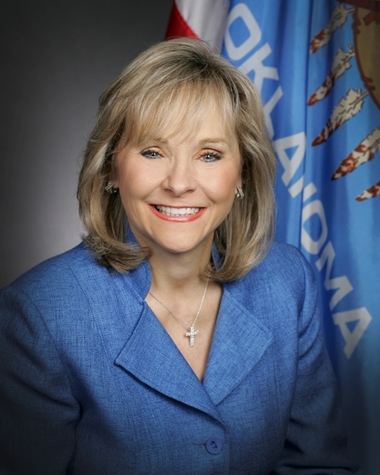Okla. governor releases some documents, refuses on others

DAN HOLTMEYER, Associated Press
SEAN MURPHY, Associated Press
OKLAHOMA CITY (AP) — Oklahoma Gov. Mary Fallin's office refused Friday to release dozens of documents surrounding decisions she made connected to the federal health care law, citing exemptions to the state's Open Records Act that media experts say do not exist.
In response to a request from several media outlets, including The Associated Press, the governor's office released in digital form more than 50,000 pages of documents relating to the federal Patient Protection and Affordable Care Act.
In a letter accompanying the release, Fallin's General Counsel Steve Mullins said 31 documents consisting of 100 pages of materials were withheld from the press based on a claim that they "fall within a privileged category."
"In this document production, the governor has invoked several legal privileges, including ones involving senior executive branch officials who are offering advice and counsel to the governor," Mullins wrote. "These privileges are frequently referred to as the executive and deliberative process privileges."
But media law experts said there is no reference in the Open Records Act, Oklahoma Constitution or existing case law to such privileges.
"To my knowledge there is no exception in the Open Records Act, nor is there any case law, affording an executive officer in Oklahoma, a public official in the executive branch in Oklahoma, for some kind of executive privilege or deliberative process privilege that is being exerted," said Bob Nelon, an attorney for the Oklahoma City firm Hall-Estill who specializes in media and intellectual law. "They are creating that, in my view, out of whole cloth. They're making it up as they go."
A telephone message left with Mullins was not returned Friday, and Fallin spokesman Alex Weintz declined to comment further on the release of the records.
"Our on-the-record statement is the letter we released with the records," Weintz wrote in an email to the AP.
Joey Senat, a journalism professor at Oklahoma State University and an expert on Oklahoma's open government laws, said the governor's refusal to release the documents sets a dangerous precedent for transparency and the public's right to know.
"She's creating secrecy that hasn't existed for the governor's office," Senat said. "There has been no court decision on that. It does not exist.
"Why doesn't she just argue that the Open Records Act doesn't apply to her, period."
Fallin in November announced that Oklahoma would not establish an Oklahoma-based health insurance exchange under the federal health care law or expand its Medicaid eligibility to provide medical coverage to thousands of low-income, uninsured citizens. Fallin's decision drew immediate praise from tea party and other conservative groups who had railed against the federal health care law, but was criticized by hospital officials and other groups who supported the expansion of Medicaid.
Fallin cited the cost to expand Medicaid and create the exchange as reasons for her decision.
The documents released Friday show the governor's office was conflicted on the creation of a state exchange, or online insurance marketplace, which was designed to facilitate competition and lower prices.
At first, Fallin and her staff accepted a $54 million federal grant to set up its exchange, but then balked after growing resistance from Republican lawmakers.
Then as Fallin's fellow Republicans in the Legislature condemned the exchange more and more loudly, her staff toyed with working around the legislators even into November, their frustration visibly mounting.
"Can the governor create a health insurance exchange by herself or does she need the Legislature?" Weintz asked Fallin's chief of staff, Denise Northrup, in an email on Nov. 7. "My understanding is the simple answer is yes she can, and no she does not. Is that correct and is that how we want to say it?"
Northrup responded: "OMG you are killing me. ... That is correct but I'm pretty sure we don't want to say it that way."
The documents also show the office was watching carefully as other states rejected the exchange. It appears Fallin made the final decision to reject the exchange less than a week before her Nov. 19 announcement.
___
Sean Murphy can be reached at www.twitter.com/apseanmurphy
Copyright 2013 The Associated Press.





